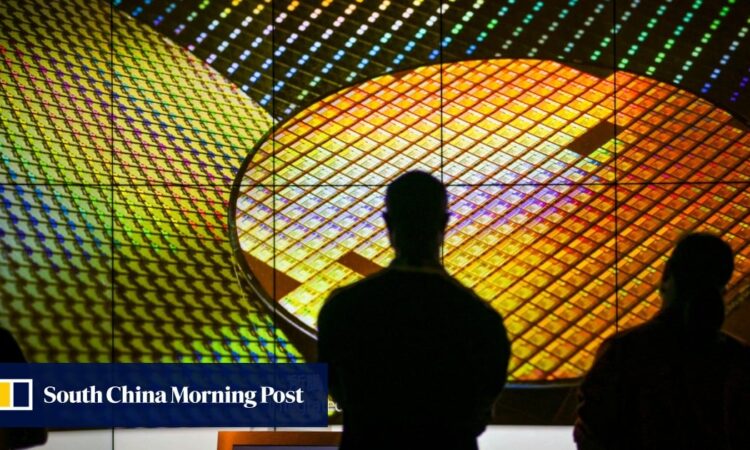US firms in Taiwan fight geopolitical, supply-chain risks by picking local partners as investments grow: AmCham head

“American companies may be forming strategic partnerships with Taiwanese suppliers and manufacturers to secure a stable supply of critical components,” Lin said. “Developing strong relationships with Taiwanese firms can help navigate potential disruptions in the global supply chain.”
Taiwan-mainland China investment hits 22-year valley as relations sour
Taiwan-mainland China investment hits 22-year valley as relations sour
Those disruptions, he said, have arisen from the Covid-19 pandemic and “geopolitical tensions”.
Global marine shipping slowed during the pandemic, while lockdowns across much of mainland China added delays in 2022. The world’s tech supply chains have been re-routing since the US-China trade dispute began in 2018.
Taiwan supplies about 60 per cent of the world’s semiconductor chips, including the most technologically advanced. Hi-tech comprises about one-third of the island’s economy and places it at the centre of global manufacturing supply chains for PCs and smartphones.
Beijing sees Taiwan as part of China to be reunited by force if necessary. Most countries, including the US, do not recognise Taiwan as an independent state, but Washington is opposed to any attempt to take the self-governed island by force and is committed to supplying it with weapons.
Some American companies … have increased their investments in Taiwan, either by establishing or expanding operations
Cross-strait tensions have escalated since mid-2022, prompting some foreign companies in Taiwan to discuss internally what might happen in case of any military conflict.
“The global supply-chain disruptions of recent years have prompted businesses to focus on building resilience,” Lin said. That process, he said, includes “contingency plans”.
But American investment has grown at the same time, Lin said.
“Taiwan, being a key player in the technology and semiconductor industries, has likely attracted attention as a strategic location for diversification,” Lin said. “Some American companies, especially [those dealing in] semiconductors, logistics and tech, have increased their investments in Taiwan, either by establishing or expanding operations.”
Time to compromise? Has US economic growth strengthened its hand with China?
Time to compromise? Has US economic growth strengthened its hand with China?
Approved investments in Taiwan from the United States reached US$932 million last year, up from US$398 million in 2022 and reaching the highest single-year dollar amount since US$2.8 billion in 2008, according to the Taiwan government’s Department of Investment Review.
US-based tech giants such as Google, Qualcomm and Micron Technology have boosted their Taiwan investments over the past decade. Some have expanded to harvest Taiwan’s relatively inexpensive engineering talent; others to be near crucial hi-tech supplies.
Eyeing fix for talent shortage, Taiwan opens door wider for foreign graduates
Eyeing fix for talent shortage, Taiwan opens door wider for foreign graduates
In a survey of AmCham’s 580 members, released on Tuesday, 81 per cent said in November and December that they were “confident” about Taiwan’s economic outlook this year. The survey found that 41 per cent anticipated adding investments in 2024, and 51 per cent expected to hold at current levels.
Most called cross-strait relations the most important future issue for Taiwan, and 46 per cent cited geopolitical uncertainties as the chief reason that would avoid adding to their positions in Taiwan.
It makes sense for American companies to partner with local tech firms, said Liang Kuo-yuan, retired founder of the Taipei-based Yuanta-Polaris Research Institute think tank.
“This is possible because Taiwan has such a complete ecosystem,” Liang said. “[American companies] might have been thinking that, without geopolitical risk, they would do it on their own, but now you’ve got the geopolitical risk, so you find a Taiwanese business and share it.”
American co-ownership in Taiwanese companies can effectively help “extend production lines and manufacturability” for a Taiwanese firm to the United States if needed, said Hu Jin-li, professor at the Institute of Business and Management at the National Yang Ming Chiao Tung University in Taipei.
He cited New York-traded Taiwan Semiconductor Manufacturing Company (TSMC), the world’s largest contract chip maker, as an example. TSMC is expanding now in the US state of Arizona.
US partners also may “make up for the weakness of Taiwan’s firms” in marketing, offshore retailing, and access to raw materials, Hu said.
Taiwan’s key problems, the chamber of president said, are a lack of English skills and local business cultures that don’t always mesh with American business styles.
“Taiwan should be focused on bilingual policy,” Lin said. “While English is taught in Taiwanese schools, there may still be variations in proficiency levels. American businesses looking for bilingual or English-speaking talent may face challenges, particularly in certain specialised roles.”
After long decline, Taiwan rides AI demand wave to double-digit export growth
After long decline, Taiwan rides AI demand wave to double-digit export growth
Officials in Taiwan, where Mandarin Chinese and the Hokkien dialect are the dominant languages, have approved a list of actions aimed at raising English levels through 2030.
Taiwan would effectively compete in Asia with Hong Kong, Singapore, India and the Philippines – all places where English is more widely used today.
East-West differences in business culture still challenge other American firms in Taiwan, Lin said.
“Some American businesses may seek employees with international experience or those who are culturally attuned to the business practices of the United States,” Lin said. “Finding individuals who meet these criteria might be more challenging, depending on the industry.”






